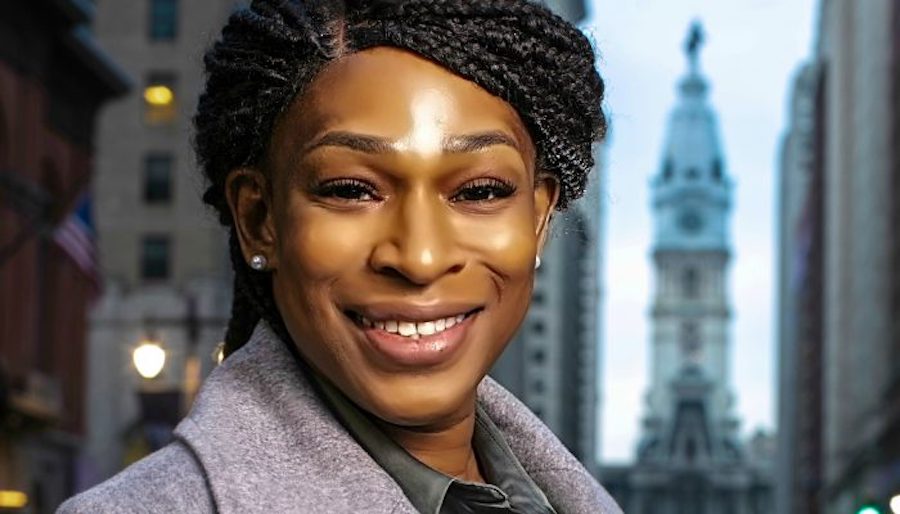It’s Not “Executive Privilege” When Black Professionals Assert Their Titles for Survival
This is what I heard when Celena Morrison yelled, "I work for the mayor!"

Celena Morrison / Photograph via City of Philadelphia
The situation was hauntingly familiar: a viral video of a white law enforcement officer acting rather aggressively — arguably hostilely — toward a Black person during a tense traffic stop.
It doesn’t matter the time of day, the weather, the gender or sexual orientation of the Black person — we’ve seen all too often, particularly in the age of social media and omnipresent cell phones, that these situations can end in chaos, disgust or death.
Fortunately, the viral video involving a contentious confrontation on the Vine Street Expressway between a state trooper and Celena Morrison, the executive director of Philly’s Office of LGBT Affairs, and her husband, Darius McLean, chief operating officer of Philadelphia’s William Way Community Center, didn’t end in death.
It did end in disgust.
“I work for the mayor! I work for the mayor!” Morrison yells as she records video of McLean lying on the ground in the rain.
“Give me your hands or you’re getting tased,” the trooper is heard yelling before he approaches Morrison.
Seconds later, her phone’s camera is no longer trained on the encounter, and we hear her yelling that the trooper has “punched” her.
What sparked all this chaos? Authorities told the press that Morrison was pulled over for multiple vehicle code violations (such as driving with an expired and suspended registration). McLean, who was traveling in a different car, pulled over, presumably to assist his wife. There have thus far been no formal charges filed against Morrison or McLean following the incident on Saturday, March 2nd.
Currently, the trooper involved has been placed on restricted duty while the state police investigate the incident. McLean and Morrison have retained a civil rights lawyer and have said they intend to file a lawsuit for damages.
One would think that something so disturbing — or, as Mayor Cherelle Parker described it, “very concerning” — couldn’t get any worse. But then it did, when some corners of the media began parsing Morrison’s words.
In his Substack, Philadelphia journalist Ralph Cipriano argues that Morrison shouting her job title at the state trooper while her husband was on the ground being handcuffed in the rain was her asserting “executive privilege.”
Far-right conservative talking head Matt Walsh of the Daily Wire was quick to discredit Morrison, accusing her of “making it worse” and saying she was acting like an “a-hole” toward law enforcement. “She announced herself,” Walsh added in regard to Morrison naming her title during the incident. “And that was supposed to be it. … I don’t know if she pulled out her badge … however it unfolded, the fact that she was the executive director of the office of LGBT affairs apparently didn’t help her in this case.”
Of course, such rhetoric has only fueled racist, transphobic and bigoted discourse on social media that further assassinates the characters of Morrison and her husband.
I don’t know how to say this this politely, so I won’t: Give me a fucking break.
A Black transgender couple is on camera, trying to navigate a situation that could prove fatal in a heartbeat. I don’t know where Cipriano and Walsh have been for the past several years, but unarmed Black people confronted by law enforcement — regardless of perceived status — have too often been on the losing side of this power equation.
What Morrison did in that moment is more common than not for Black people in encounters with law enforcement; such moments are about de-escalation, not invoking some shroud of privilege.
I’m a Black man in America, so I was given “the talk” by my parents about how to interact with police before I even became a teenager. Sadly, as someone who has been interrogated by law enforcement, who has been stopped and frisked as a young adult, and who has endured the dehumanizing experience of being in a car during an unnecessary traffic stop — I would come to realize that the police will still incite fear, regardless of my respectability, in such moments.
Being an articulate, soft-spoken Ivy League grad didn’t shield me from being racially profiled by a cop — but it may have saved my life.
My nice suit and lack of a criminal record didn’t stop law enforcement from singling me out and patting me down while I was minutes away from an internship interview when I was 19 — but it may have stopped me from being unjustly detained.
My name recognition and massive following on social media didn’t stop me from being called into a counterterrorism unit and interrogated for over an hour for posting a harmless Facebook post — but it may have prevented me from experiencing such targeted bullshit again.
Translation: These were my attempts to humanize myself during encounters with a system that would easily discard me. As flawed and uncertain as the results can be, in such situations, signaling whatever status we can is, frustratingly, the only tool Black people currently have in an unjust society.
To ignore the role of race in policing interactions is intellectually dishonest. When I heard Morrison in that video yelling that she worked for the mayor, I didn’t hear a plea to avoid accountability. I heard a cry for harm reduction — an attempt to ensure that she and her husband survived the encounter. After what happened to George Floyd, after what happened to Eric Garner, after what’s happened to countless nameless, faceless Black people who were extrajudicially killed, I can’t hear it as anything else.
What Morrison was doing at that moment was attempting to ensure that she and her husband weren’t going to be another hashtag — and if she had to throw whatever ounce of influence or title or status she had to try to save him, so be it. That’s not “executive privilege” — that’s an act of survival.


